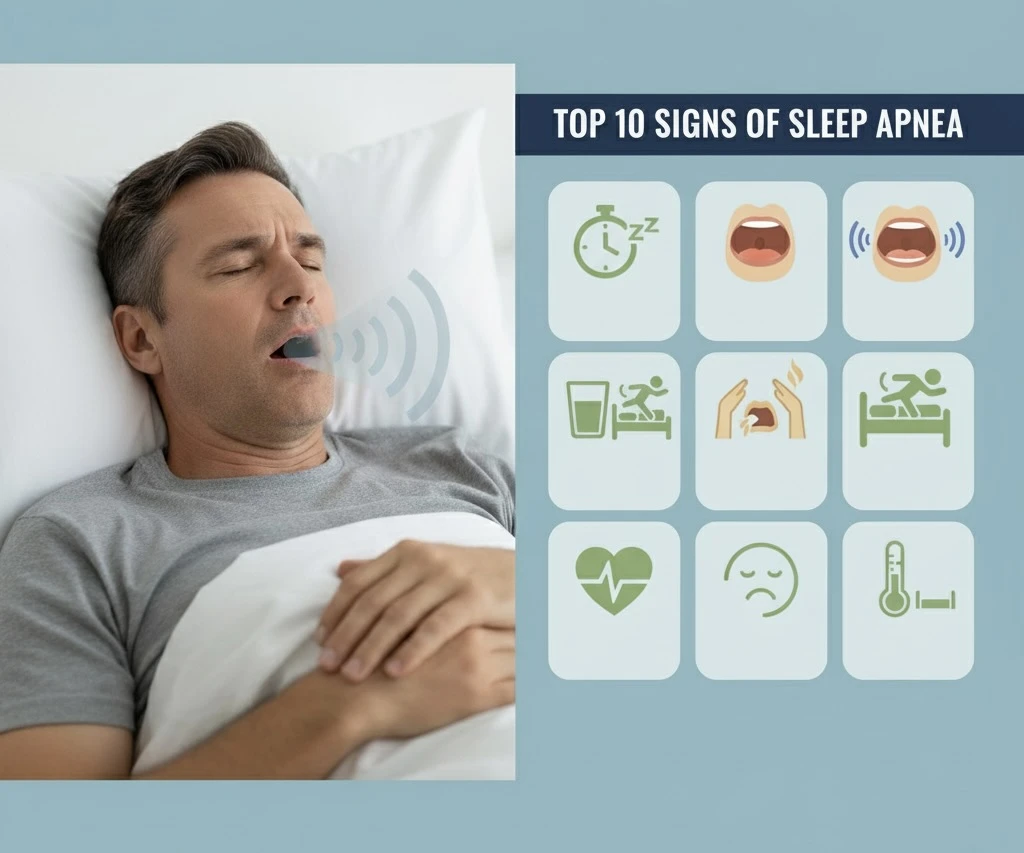

Sleep apnea is one of the most common yet underdiagnosed sleep disorders worldwide. It causes repeated pauses in breathing during sleep, which can drastically reduce oxygen levels in your body. Over time, this can strain your heart, damage your brain, and increase the risk of life-threatening conditions like hypertension, diabetes, and stroke.
What makes sleep apnea especially dangerous is how quietly it develops. People often ignore early warning signs, mistaking them for simple tiredness, stress, or aging. In reality, these signs are your body’s way of telling you something is wrong.
This article will explain the 10 most common signs and symptoms of sleep apnea that you must not overlook. Recognizing them early can help you seek medical advice and get a sleep study test done for accurate diagnosis.
Sleep apnea comes in three main types:
All types disrupt normal sleep cycles, reducing deep restorative sleep and leading to chronic fatigue and other serious health issues.
Snoring is often dismissed as harmless, but loud, regular snoring is the most common symptom of obstructive sleep apnea. The sound happens when soft tissue in your throat partially blocks your airway and vibrates during breathing.
If snoring is loud enough to wake your partner or is accompanied by pauses in breathing, it’s a major red flag. Don’t ignore this — it’s often the first sign of sleep apnea.
Tip: Learn how a sleep study test at home can confirm if snoring is related to sleep apnea.
These pauses, called apneas, can last from 10 seconds to a minute or more and may occur dozens of times each night. They are usually reported by a partner or family member since you may not notice them yourself.
Each pause drops your blood oxygen levels and forces your body to briefly wake up to resume breathing. This disrupts your deep sleep without you even realizing it.
People with sleep apnea often wake up suddenly at night, gasping for air or choking. This happens because the airway closes completely, and your brain sends an emergency signal to wake you just enough to breathe again.
This repeated cycle prevents you from reaching deep, restorative stages of sleep, which leaves you exhausted in the morning.
One of the clearest effects of sleep apnea is extreme tiredness during the day, even if you think you slept enough hours. Because your sleep is constantly disrupted, you never reach the deep stages of sleep needed to feel rested.
This can make you drowsy at work, less alert while driving, and less productive overall. Many people with sleep apnea report dozing off during meetings or while watching TV.
Morning headaches are a surprisingly common symptom. They are caused by drops in oxygen and buildup of carbon dioxide during the night, which affect blood flow to the brain.
These headaches are usually dull and go away within a few hours of waking. If you often wake up with headaches, it’s worth getting evaluated for sleep apnea.
Poor sleep quality affects brain function. People with untreated sleep apnea often experience “brain fog” — trouble concentrating, forgetfulness, slower reaction times, and difficulty focusing on tasks.
Over time, chronic sleep deprivation can even increase the risk of dementia and other cognitive disorders.
Lack of deep sleep affects the brain’s emotional regulation centers. This can cause mood swings, depression, anxiety, and irritability.
Many patients only seek medical help after noticing major changes in their mood, not realizing that untreated sleep apnea is affecting their mental health.
Sleep apnea puts stress on the cardiovascular system. Every time your breathing pauses, oxygen levels drop, triggering a surge in stress hormones like adrenaline.
This increases blood pressure and forces the heart to work harder. Over time, untreated sleep apnea can lead to hypertension, irregular heartbeat, heart attack, or stroke. Many people diagnosed with high blood pressure later discover they also have sleep apnea.
Breathing through your mouth at night (because your nose is blocked or your airway collapses) causes your mouth and throat to dry out.
This often leads to a sore throat or dry mouth when you wake up. While this symptom alone doesn’t confirm sleep apnea, it’s common among people with the condition.
Sleep apnea and weight are closely linked. Lack of quality sleep disrupts hormones that control hunger and metabolism — causing increased appetite and weight gain.
At the same time, excess weight (especially around the neck) makes the airway more likely to collapse during sleep, worsening sleep apnea. This creates a cycle that’s hard to break without treatment.
Ignoring these warning signs can have serious consequences. Untreated sleep apnea increases the risk of:
Because the condition develops gradually, many people normalize their fatigue and snoring until serious complications arise.
If you recognize several of these symptoms in yourself or a loved one, don’t wait. The only way to confirm sleep apnea is through a sleep study test (also called polysomnography).
There are two main types:
A home sleep study is often the easiest and most comfortable way to get tested. It measures your breathing patterns, oxygen levels, heart rate, and snoring to confirm the diagnosis.
At Healthy Jeena Sikho, we offer sleep study tests at home to make the process stress-free and convenient.
Sleep apnea is common, serious, and often overlooked. But it doesn’t have to stay hidden. Recognizing the warning signs early gives you the power to take control of your health.
If these symptoms sound familiar, don’t ignore them. Talk to your doctor or book a sleep study test at home to get the answers you need. Better sleep could transform your health, energy, and quality of life.